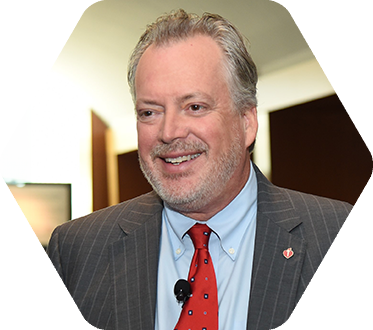Class of 1984
John Meiners ’84 arrived at Eckerd College in the fall of 1980 and quickly found his way to the Eckerd College Search and Rescue Team (EC-SAR), the only college maritime rescue program in the country.
It was a tense, bleak time in Tampa Bay’s maritime history. In January of that year, the U.S. Coast Guard cutter Blackthorn collided with a tanker and sank near the Sunshine Skyway Bridge, costing 23 lives. Four months later, the freighter Summit Venture struck a support pier on the bridge, causing a section of the bridge to collapse and 35 people to lose their lives.
John had become a certified SCUBA diver at age 15, and EC-SAR was just beginning to form a dive rescue program. John immediately signed up. He went on to become a divemaster, a boat captain, and an EMT.

“The Coast Guard called us many times to respond to crashed planes or swimmers who didn’t surface.” John recalled recently. “Twice they flew Mike Rosselet ’83 and me out into the Gulf on helicopters and would lower us onto a cutter so we could dive and look for a swimmer. I was about 19 or 20 at the time.
“Those are the things that helped shape me. The training to become a rescue diver teaches you a lot about yourself. Like how to manage stress when you’re in total darkness under a bridge looking for someone.
“My experience at Eckerd was something I appreciate more every year. How in so many ways it shaped the path that I eventually took. As I look back now and start to connect the dots, many of the career choices I’ve made had their roots in my experience at Eckerd. I want others to have the same experience.”
John’s father, Tom, served as the director of Eckerd’s physical plant for 27 years. It was his dad who introduced him to the Waterfront program.
“I went to Clearwater Central Catholic High School, and most of the students were going off to other colleges,” John said. “But I knew right then this is where I wanted to be.”
His parents wanted him to become a doctor, so John majored in chemistry.
“But I loved the management courses I was taking and switched majors halfway through my junior year,” he added. “I had to take summer courses to graduate on time, but it was one of the best decisions I ever made. And the chemistry background I had helped me a great deal, too, because of the work I do now with scientific organizations. So it all came together.”
After graduating in 1984, John worked at the Waterfront securing donated boats, helping manage EC-SAR and fundraising. He moved on to a role with Dale Carnegie Training Systems in Tampa, and within a few months, was promoted to sales manager at a new office in Pinellas County. In 1990, after a few successful years selling and teaching, a colleague mentioned the American Heart Association was looking for someone with fundraising and sales experience to help lead their St. Petersburg chapter.
After 34 years, John is still with the Association. And he’s still striving to help people and save lives.
In his role as chief of mission aligned businesses and healthcare solutions, he leads the development and expansion of the Association’s businesses that support its global mission to be a force for longer, healthier lives. John also heads the development and expansion of the Association’s healthcare quality and professional education programs, which train more than 22 million people each year in 105 countries.
Among the business areas he leads are Emergency Cardiovascular Care, Hospital Quality and Certification, Resuscitation Quality Improvement (RQI) Partners, the Center for Health Teach and Innovation, and is now the president of Healthcare Quality and Research Systems (a global subsidiary of the Association).
John’s greatest challenge—his most difficult rescue mission—was the pandemic.

Diving with the newly established EC-SAR dive rescue program
“We went to work immediately to see how we could help,” John said. “We have a business that tracks performance in hospitals—clinical registries—that normally takes nine months to set up. We launched in nine days.”
In 2020, John’s division delivered just-in-time oxygenation and ventilation training for healthcare professionals engaged in the COVID-19 pandemic response and compiled interim CPR guidelines to help rescuers treat victims of cardiac arrest with suspected or confirmed COVID-19. Through his leadership, the Association developed the first cardiovascular disease–focused COVID-19 registry, available to health care systems in the U.S. and internationally.
In an effort to pass his knowledge and experience on to others, John has mentored more than 100 Association employees. And several Eckerd College students, part of the College’s Career Mentor program.
“I always had great mentors in my life,” John explained, “and I think there’s a lot of value in having the advice of someone who’s been there before.
“When I got the opportunity to be a mentor at Eckerd, I took it, and it’s been really rewarding. It’s great to see people trying to make the same career decisions I had back in the day. What path to take? How to prepare themselves once they decide that path. And so many other important things.”
A member of the College’s Kadel Society, and the recipient of the 2024 Renee Register ’83 Outstanding Alumni Award, John lives in Dallas and, given that city’s geography, he is temporarily boatless. But as he has done before, he made some adjustments.
“When I moved to Dallas, I wondered what I was going to do,” he said. “Golf just didn’t seem to do anything for me, so I bought a race car and now I spend my weekends track racing.
“It’s more my speed.”
Story by Tom Zucco




